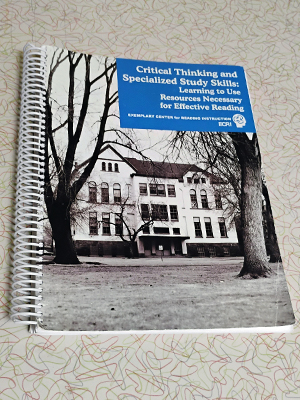
Teaching Critical Thinking and Specialized Study Skills
Critical thinking and specialized study skills assist a reader to obtain information more readily and to transfer the information so it makes sense and is used to serve meaningful purposes identified by the learner.
$49.95
This book is spiral bound so teachers can hold an open book while teaching.
Item Description
Critical thinking and specialized study skills assist a reader to obtain information more readily and to transfer the information so it makes sense and is used to serve meaningful purposes identified by the learner. Teachers use a variety of written materials, literary genre, and content texts to teach such skills.
The specific lessons contained in this text include:
- Select the Topic
- Select the Main Idea
- Evaluate the Relevancy of Sentences, Parts I and II
- Organize Information on Levels of Importance
- Take Notes:
- Write Topic and Main Idea from What Is Read/Heard
- Write Topic and Subtopics in Outline Form from What Is Read/Heard
- Alphabetize:
- Say Letters of the Alphabet in Order, and Arrange Words in Alphabetical Order by the First Two, Three, and Four Letters
- Arrange Words and Acronyms in Alphabetical Order
- Locate and Use:
- Information, I (textbook, dictionary, encyclopedia, etc.)
- Information, II (variety of other sources, such as atlas, thesaurus, etc.)
- Parts of a Newspaper
- Follow Written and Verbal Directions
- Read and Use Graphic Aids
- Survey a Book/Chapter
- Develop Reading Flexibility: Skimming
- Develop Reading Flexibility: Scanning
- Write an Essay: Descriptive, Narrative, Persuasive, Expository
- Read and Write Abbreviations
- Read and Use Symbols
- Locate and Use Measuring Devices
- Learn from Observing Demonstrations and from Personal Experience
Although the list of critical thinking and specialized skills above is not exhaustive, the use of these skills will stimulate wider reading with greater understanding.
In addition to general reading, the above-listed skills are frequently used in specific ways in various subject areas. Samples of these include reading maps and time lines in social studies, reading graphs and equations in mathematics, reading figures and diagrams in science, reading recipes in home economics and football plays in physical education. Some of these specialized skills can be taught in a generic way as the reading of graphic aids is taught.
This text will assist teachers in helping students to accommodate to a different style of writing, which is characterized by tenseness, density of ideas, and inclusion of many unfamiliar and different concepts. Specialized study skills enable students to learn to use resources necessary for effective reading.